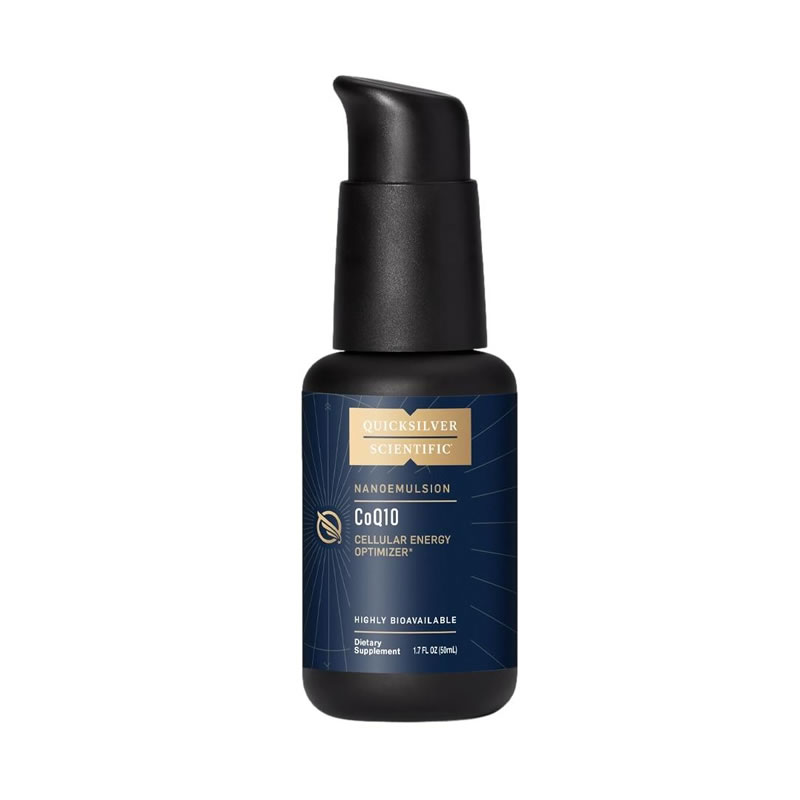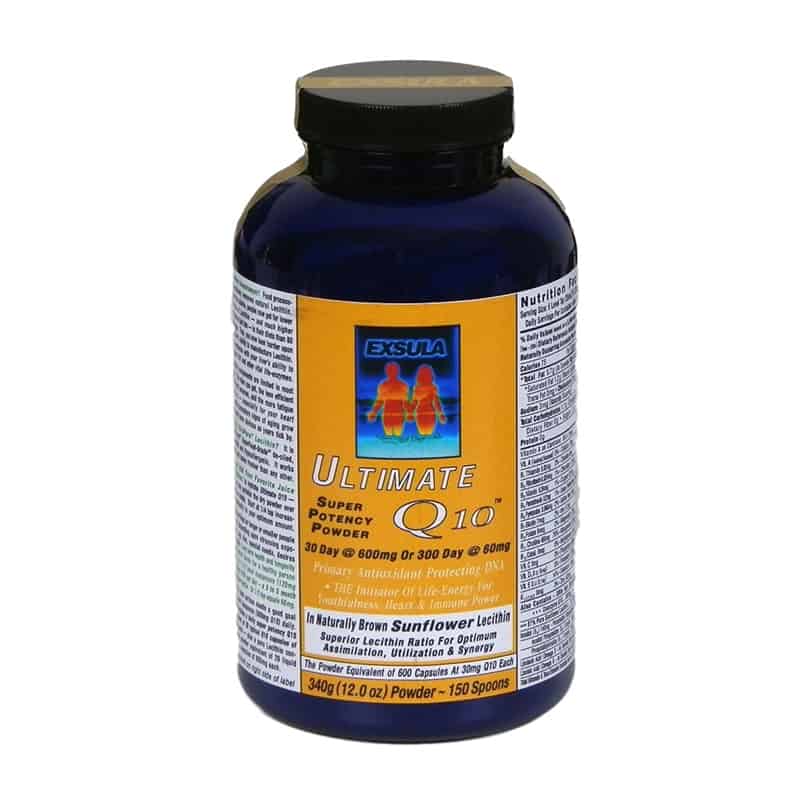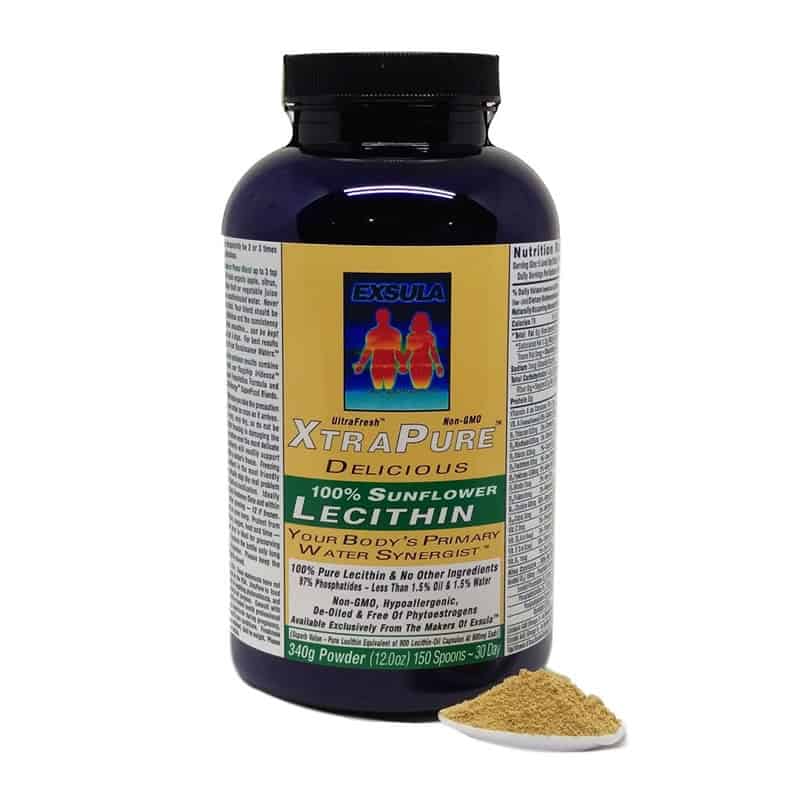No products in the cart.
Coenzyme Q10 Basics
Coenzyme Q10 (or CoQ10 for short) is also known as ubiquinone or ubiquinol. CoQ10 helps your energy production by assisting the mitochondria in producing ATP. It is a vitamin-like nutrient that is fat-soluble and has powerful antioxidant activity that can even recharge the activity of other antioxidants.
Supplementing with CoQ10 helps your cells to breathe (cellular respiration) and produce more energy. It improves the function of your mitochondria. A deficiency of CoQ10 can cause Mitochondria dysfunction, which leads to a host of other health issues.
Benefits Of Taking CoQ10
- May help with preventing certain types of very severe headaches
- Can prevent oxidation of LDL cholesterol in the body
- Protects the heart from lack of oxygen
- More energy, less fatigue
- Helps nervous disorders of the brain
- Good for heart and cardiovascular health
- Reduces risk of blood clot events
- Can help lower insulin resistance when combined with proper diet
- Can boost immunity and increase macrophage activity
Some studies have shown weight loss benefits from supplementing with CoQ10. It is absolutely essential for the health of your heart and cardiovascular system.
Why Do We Need It?
CoQ10 production in the body declines as people reach their 30’s. When the levels of Coenzyme Q10 start dropping, so does our health. Once levels drop to a certain point we can start to see cardiovascular issues begin. Other health issues are weak immunity, periodontal problems, lack of energy and weight gain. At the age of 40 we only have about 64% of the CoQ10 we had at 20.
Some viral infections can cause damage to your mitochondria. In that case supplementing with CoQ10 to help the function of your mitochondria is very important. Your liver requires CoQ10 to produce other enzymes as well. Without sufficient levels of CoQ10 your production of all enzymes enters the downward spiral characteristic of aging, and all the signs from poor health to reduced physical mobility and declining brain function begin to set in.
People who suffer from overall body pain often have CoQ10 levels that are unevenly distributed in the body. This can cause increased oxidative stress and can contribute to chronic pain and inflammation. Oral ingestion of CoQ10 supplements have been found to activate macrophages, which enhances immune function significantly. In double-blind studies and individual case reports, neuromuscular neurogenic atrophies of both the skeletal system and cardiac muscle showed improvement after oral ingestion.
Deficiencies
Deficiency of CoQ10 can manifest in many ways including high blood pressure, hair loss, damaged cell membranes, exhaustion, severe headaches, gum disease, liver, heart and cardiovascular issues and more. ACE Inhibitors, calcium channel blockers, beta blockers and blood pressure medications deplete CoQ10 in the body.
A deficiency of CoQ10 can also affect your brain, muscles and your kidneys. Brain effects can include problems with coordination and convulsions/spasms.
Deficiencies can cause:
- Weakened or stiff muscles
- Vision loss caused by degeneration of the optic nerve or issues with the retina
- Impaired kidney function, including kidney failure
- Reduction of red blood cells and certain white blood cells
- Abnormal blood clotting
Again, once a severe deficiency is taking place, food sources will not replenish it. You must supplement for severe deficiencies.
CoQ10 And Cholesterol
When CoQ10 is depleted in the body, it causes LDL cholesterol to become oxidized. This starts a chain-reaction of events and makes the LDL bore holes in your arterial walls which causes inflammation. This will increase your chances of a heart attack or blood clot event. Statin use inhibits the production of cholesterol and CoQ10. If you are on a statin medication, you probably need to be taking CoQ10. If you are on these medications, consider discussing supplementation with your healthcare provider or pharmacist.
Many people are still under the impression that a low-fat diet is the way to prevent health issues of the cardiovascular system. This notion is completely false and yet encouraged by the big food companies that want to sell you their processed low-fat, high sugar foods. CoQ10 is fat soluble so you are further sabotaging your health by not eating healthy fats so your body can absorb CoQ10. Healthy fats are extremely important for our bodies and for the absorption of fat-soluble vitamins and minerals as well.
Dosage And Cautions
How much do you need to take? 1 mg per pound of body weight is recommended for normal use.
In clinical trials, patients with nervous disorders of the brain saw improvement in dosages of 1200mg per day (in divided dosages throughout the day). They tested lower and higher dosages and 1200mg was the most effective dosage (so more isn’t always better!).
A study published in the Journal Of Clinical Psychopharmacology found that 18 people with extremely low moods who took 400-800mg per day for a month decreased the severity of low mood and improved symptoms of fatigue, sadness, brain fog and difficulty concentrating. If you are on medication for severely low mood, please discuss this option with your healthcare provider.
Caution is advised if you are taking Warfarin (Coumadin). Consult your pharmacist before adding Coenzyme Q10 to your supplements if you are taking this type of medication.
CoEnzyme Q10 and Severe Headaches
Supplementing with CoEnzyme Q10 for severe headaches can reduce the frequency in chronic sufferers, reports a study in Neurology (2005;64:713-5). “Efficacy of coenzyme Q10 in (severe headache) prophylaxis: A randomized controlled trial”
CoEnzyme Q10 and Heart, High Blood Pressure, Diabetes and Infertility
“The Role of Coenzyme Q10 in Clinical Medicine: Part II. Cardiovascular Disease, Hypertension, Diabetes Mellitus and Infertility“







